Chinese Journal of Tissue Engineering Research ›› 2020, Vol. 24 ›› Issue (7): 1009-1015.doi: 10.3969/j.issn.2095-4344.2022
Previous Articles Next Articles
Effects of strontium-modified titanium surfaces on adhesion, migration and proliferation of bone marrow mesenchymal stem cells and expression of bone formation-related genes
Liu Chundong1, Shen Xiaoqing1, Zhang Yanli2, 3, Zhang Xiaogen1, Wu Buling2, 3
- 1Department of Stomatology, Zhujiang Hospital, Southern Medical University, Guangzhou 510280, Guangdong Province, China; 2Department of Stomatology, Nanfang Hospital, Southern Medical University, Guangzhou 510515, Guangdong Province, China; 3College of Stomatology, Southern Medical University, Guangzhou 510515, Guangdong Province, China
-
Received:2019-04-23Revised:2019-04-30Accepted:2019-07-15Online:2020-03-08Published:2020-01-19 -
Contact:Wu Buling, MD, Professor, Chief physician, Department of Stomatology, Nanfang Hospital, Southern Medical University, Guangzhou 510515, Guangdong Province, China; College of Stomatology, Southern Medical University, Guangzhou 510515, Guangdong Province, China -
About author:Liu Chundong, MD, Attending physician, Department of Stomatology, Zhujiang Hospital, Southern Medical University, Guangzhou 510280, Guangdong Province, China -
Supported by:the Medical Research Foundation of Guangdong Province, No. B2016040
CLC Number:
Cite this article
Liu Chundong, Shen Xiaoqing, Zhang Yanli, Zhang Xiaogen, Wu Buling. Effects of strontium-modified titanium surfaces on adhesion, migration and proliferation of bone marrow mesenchymal stem cells and expression of bone formation-related genes[J]. Chinese Journal of Tissue Engineering Research, 2020, 24(7): 1009-1015.
share this article
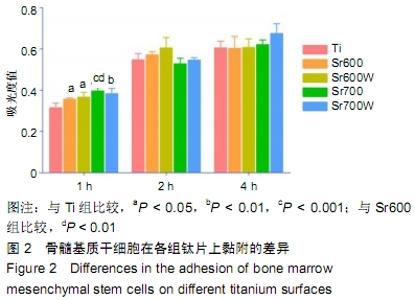
2.2 各组样品表面元素含量 X射线能谱仪检测结果显示在NaOH处理后有(8.48±0.13)%的Na+结合到钛片表面,而这些Na+被锶元素全部替代,(5.37±0.35)%的锶元素结合到钛片表面,随后的热处理及水化处理使锶离子的原子百分含量稍微降低,但各种元素所占的原子百分比未出现明显变化(部分数据之前文章已采用,故未列出)[13]。 2.3 骨髓基质干细胞在材料表面的黏附 各组钛片表面骨髓基质干细胞黏附均随培养时间延长而增高。在1 h时,锶改性后各组钛片表面细胞黏附较纯钛组升高,且Sr700组较Sr600组黏附细胞数量增加,差异有显著性意义(P < 0.01)。在2 h和4 h时,各组钛片表面黏附量之间差异无显著性意义(P > 0.05),但Sr700W组在4 h时黏附平均值较其他组增加。Sr700W与Sr700之间、Sr600W及Sr600之间在任何时间点黏附细胞量差异无显著性意义(P > 0.05),说明经热处理后再水化处理未能明显促进骨髓基质干细胞的早期黏附,见图2。 "
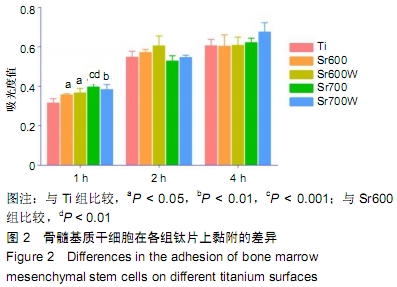
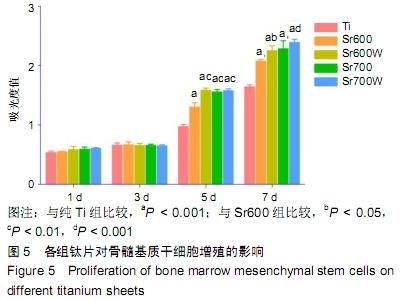
2.6 骨髓基质干细胞在钛片表面的增殖情况 各组钛片表面骨髓基质干细胞增殖均随培养时间延长而增高。在1 d和3 d时,各组钛表面细胞增殖之间差异无显著性意义(P > 0.05)。在5 d和7 d时,锶改性钛片表面细胞增殖较Ti组明显升高,差异有非常显著性意义(P < 0.001)。在5 d时,Sr600W组的细胞增殖数目较Sr600组高,差异有非常显著性意义(P < 0.01)。Sr700和Sr700W组的细胞增殖数目较Sr600组高,差异有非常显著性意义(P < 0.01)。在7 d时,Sr600W和Sr700W组的细胞增殖均明显高于Sr600组,差异有显著性意义(P < 0.05)。Sr700W组的细胞增殖稍高于Sr700组,但差异无显著性意义(P > 0.05)。以上说明水化处理对于骨髓基质干细胞的增殖具有促进作用,见图5。"

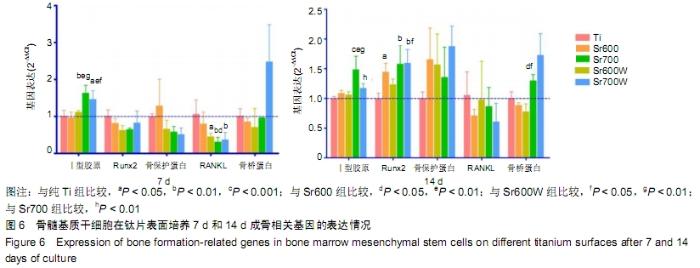
2.7 成骨分化相关基因的表达 在骨髓基质干细胞培养 7 d和14 d之后,对每个基因每个时间点各组之间的差异采用单因素方差分析进行统计,在7 d时,Sr700和Sr700W组表面细胞的Ⅰ型胶原表达均高于Ti组(P < 0.01)、Sr600组(P < 0.01)及Sr600W组(P < 0.05)。Sr700和Sr600W组表面细胞的Runx2和骨保护蛋白表达水平低于Ti组,但差异无显著性意义(P > 0.05)。Sr600W组(P < 0.05)、Sr700组(P < 0.01)和Sr700W组(P < 0.01)表面细胞的RANKL表达水平低于Ti组。在培养14 d时,Sr700组表面细胞的Ⅰ型胶原表达高于Ti组(P < 0.001)、Sr600组(P < 0.01)、Sr600W组(P < 0.01)及Sr700W组(P < 0.01)。Sr600组表面细胞的Runx2表达高于Ti组(P < 0.05),Sr700组及Sr700W组的Runx2表达也高于Ti组(P < 0.01),且Sr700W组的Runx2表达高于Sr600W组(P < 0.05)。各组钛片骨保护蛋白表达高于Ti组、RANKL表达低于Ti组,各组之间差异无显著性意义(P > 0.05),而Sr700组表面细胞的骨桥蛋白表达高于Sr600组(P < 0.05)和Sr600W组(P < 0.05),见图6。 "
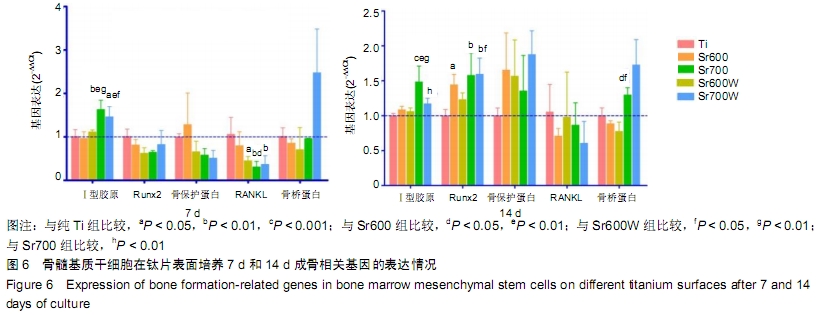
| [1] RACHNER TD, KHOSLA S, HOFBAUER LC. Osteoporosis: now and the future. Lancet. 2011;377(9773):1276-1287. [2] RADI IA, IBRAHIM W, ISKANDAR SMS, et al. Prognosis of dental implants in patients with low bone density: A systematic review and meta-analysis. J Prosthet Dent. 2018;120(5): 668-677. [3] TEMMERMAN A, RASMUSSON L, KÜBLER A, et al. A Prospective, Controlled, Multicenter Study to Evaluate the Clinical Outcome of Implant Treatment in Women with Osteoporosis/Osteopenia: 5-Year Results. J Dent Res. 2019; 98(1):84-90. [4] YIN G, LIU H, LI J, et al. Adenoviral delivery of adiponectin ameliorates osteogenesis around implants in ovariectomized rats. J Gene Med. 2019;21(2-3):e3069. [5] DEREKA X, CALCIOLARI E, DONOS N, et al. Osseointegration in osteoporotic-like condition: A systematic review of preclinical studies. J Periodontal Res. 2018;53(6): 933-940. [6] GRISA A, VEITZ-KEENAN A. Is osteoporosis a risk factor for implant survival or failure. Evid Based Dent. 2018;19(2): 51-52. [7] 周延民,汪汉池,赵静辉,等.种植体表面改性效果的研究[J].口腔医学研究,2018,34(4):343-346. [8] PILMANE M, SALMA-ANCANE K, LOCA D, et al. Strontium and strontium ranelate: Historical review of some of their functions. Mater Sci Eng C Mater Biol Appl. 2017;78: 1222-1230. [9] SCARDUELI CR, BIZELLI-SILVEIRA C, MARCANTONIO RAC, et al. Systemic administration of strontium ranelate to enhance the osseointegration of implants: systematic review of animal studies. Int J Implant Dent. 2018;4(1):21. [10] OFFERMANNS V, ANDERSEN OZ, RIEDE G, et al. Effect of strontium surface-functionalized implants on early and late osseointegration: A histological, spectrometric and tomographic evaluation. Acta Biomater. 2018;69:385-394. [11] ROMERO-GAVILÁN F, ARAÚJO-GOMES N, GARCÍA-ARNÁEZ I, et al. The effect of strontium incorporation into sol-gel biomaterials on their protein adsorption and cell interactions. Colloids Surf B Biointerfaces. 2019;174:9-16. [12] CHEN X, CHEN Y, SHEN J, et al. Positive modulation of osteogenesis on a titanium oxide surface incorporating strontium oxide: An in vitro and in vivo study. Mater Sci Eng C Mater Biol Appl. 2019;99:710-718. [13] LIU C, ZHANG Y, WANG L, et al. A Strontium-Modified Titanium Surface Produced by a New Method and Its Biocompatibility In Vitro. PLoS One. 2015;10(11):e0140669. [14] ZHOU C, XU AT, WANG DD, et al. The effects of Sr-incorporated micro/nano rough titanium surface on rBMSC migration and osteogenic differentiation for rapid osteointegration. Biomater Sci. 2018;6(7):1946-1961. [15] POLISETTI N, CHAITANYA VG, BABU PP, et al. Isolation, characterization and differentiation potential of rat bone marrow stromal cells. Neurol India. 2010;58(2):201-208. [16] INSUA A, MONJE A, WANG HL, et al. Basis of bone metabolism around dental implants during osseointegration and peri-implant bone loss. J Biomed Mater Res A. 2017; 105(7):2075-2089. [17] OFFERMANNS V, ANDERSEN OZ, SILLASSEN M, et al. A comparative in vivo study of strontium-functionalized and SLActive™ implant surfaces in early bone healing. Int J Nanomedicine. 2018;13:2189-2197. [18] LIU F, LI Y, LIANG J, et al. Effects of micro/nano strontium-loaded surface implants on osseointegration in ovariectomized sheep. Clin Implant Dent Relat Res. 2019; 21(2):377-385. [19] IBRAHIM M, SCHOELERMANN J, MUSTAFA K, et al. TiO2 nanoparticles disrupt cell adhesion and the architecture of cytoskeletal networks of human osteoblast-like cells in a size dependent manner. J Biomed Mater Res A. 2018;106(10): 2582-2593. [20] FU DL, JIANG QH, HE FM, et al. Adhesion of bone marrow mesenchymal stem cells on porous titanium surfaces with strontium-doped hydroxyapatite coating. J Zhejiang Univ Sci B. 2017; 18(9): 778-788. [21] MULLEN CA, VAUGHAN TJ, VOISIN MC, et al. Cell morphology and focal adhesion location alters internal cell stress. J R Soc Interface. 2014;11(101):20140885. [22] ZHAO L, WANG H, HUO K, et al. The osteogenic activity of strontium loaded titania nanotube arrays on titanium substrates. Biomaterials. 2013;34(1):19-29. [23] HANDSCHIN AE, EGERMANN M, TRENTZ O, et al. Cbfa-1 (Runx-2) and osteocalcin expression by human osteoblasts in heparin osteoporosis in vitro. Clin Appl Thromb Hemost. 2006; 12(4):465-472. [24] LIAN JB, JAVED A, ZAIDI SK, et al. Regulatory controls for osteoblast growth and differentiation: role of Runx/Cbfa/AML factors. Crit Rev Eukaryot Gene Expr. 2004;14(1-2):1-41. [25] HU D, LI K, XIE Y, et al. The combined effects of nanotopography and Sr ion for enhanced osteogenic activity of bone marrow mesenchymal stem cells (BMSCs). J Biomater Appl. 2017;31(8):1135-1147. [26] KNIGHT CG, MORTON LF, ONLEY DJ, et al. Identification in collagen type I of an integrin alpha2 beta1-binding site containing an essential GER sequence. J Biol Chem. 1998; 273(50):33287-33294. [27] DRIVER J, WEBER CE, CALLACI JJ, et al. Alcohol inhibits osteopontin-dependent transforming growth factor-β1 expression in human mesenchymal stem cells. J Biol Chem. 2015;290(16):9959-9973. [28] REICHERT JC, QUENT VM, BURKE LJ, et al. Mineralized human primary osteoblast matrices as a model system to analyse interactions of prostate cancer cells with the bone microenvironment. Biomaterials. 2010;31(31):7928-7936. [29] LIU L, LUO Q, SUN J, et al. Cytoskeletal control of nuclear morphology and stiffness are required for OPN-induced bone-marrow-derived mesenchymal stem cell migration. Biochem Cell Biol. 2019;97(4):463-470. [30] GENG Z, WANG X, ZHAO J, et al. The synergistic effect of strontium-substituted hydroxyapatite and microRNA-21 on improving bone remodeling and osseointegration. Biomater Sci. 2018;6(10):2694-2703. [31] MI B, XIONG W, XU N, et al. Strontium-loaded titania nanotube arrays repress osteoclast differentiation through multiple signalling pathways: In vitro and in vivo studies. Sci Rep. 2017;7(1):2328. [32] LU X, ZHANG W, LIU Z, et al. Application of a Strontium-Loaded, Phase-Transited Lysozyme Coating to a Titanium Surface to Enhance Osteogenesis and Osteoimmunomodulation. Med Sci Monit. 2019;25: 2658-2671. [33] YASUDA H, SHIMA N, NAKAGAWA N, et al. Osteoclast differentiation factor is a ligand for osteoprotegerin/osteoclastogenesis-inhibitory factor and is identical to TRANCE/RANKL. Proc Natl Acad Sci U S A. 1998;95(7):3597-3602. [34] LI CW, LIANG B, SHI XL, et al. Opg/Rankl mRNA dynamic expression in the bone tissue of ovariectomized rats with osteoporosis. Genet Mol Res. 2015;14(3):9215-9224. |
| [1] | Hou Jingying, Yu Menglei, Guo Tianzhu, Long Huibao, Wu Hao. Hypoxia preconditioning promotes bone marrow mesenchymal stem cells survival and vascularization through the activation of HIF-1α/MALAT1/VEGFA pathway [J]. Chinese Journal of Tissue Engineering Research, 2021, 25(7): 985-990. |
| [2] | Liang Xueqi, Guo Lijiao, Chen Hejie, Wu Jie, Sun Yaqi, Xing Zhikun, Zou Hailiang, Chen Xueling, Wu Xiangwei. Alveolar echinococcosis protoscolices inhibits the differentiation of bone marrow mesenchymal stem cells into fibroblasts [J]. Chinese Journal of Tissue Engineering Research, 2021, 25(7): 996-1001. |
| [3] | Geng Yao, Yin Zhiliang, Li Xingping, Xiao Dongqin, Hou Weiguang. Role of hsa-miRNA-223-3p in regulating osteogenic differentiation of human bone marrow mesenchymal stem cells [J]. Chinese Journal of Tissue Engineering Research, 2021, 25(7): 1008-1013. |
| [4] | Lun Zhigang, Jin Jing, Wang Tianyan, Li Aimin. Effect of peroxiredoxin 6 on proliferation and differentiation of bone marrow mesenchymal stem cells into neural lineage in vitro [J]. Chinese Journal of Tissue Engineering Research, 2021, 25(7): 1014-1018. |
| [5] | Zhu Xuefen, Huang Cheng, Ding Jian, Dai Yongping, Liu Yuanbing, Le Lixiang, Wang Liangliang, Yang Jiandong. Mechanism of bone marrow mesenchymal stem cells differentiation into functional neurons induced by glial cell line derived neurotrophic factor [J]. Chinese Journal of Tissue Engineering Research, 2021, 25(7): 1019-1025. |
| [6] | Pei Lili, Sun Guicai, Wang Di. Salvianolic acid B inhibits oxidative damage of bone marrow mesenchymal stem cells and promotes differentiation into cardiomyocytes [J]. Chinese Journal of Tissue Engineering Research, 2021, 25(7): 1032-1036. |
| [7] | Li Cai, Zhao Ting, Tan Ge, Zheng Yulin, Zhang Ruonan, Wu Yan, Tang Junming. Platelet-derived growth factor-BB promotes proliferation, differentiation and migration of skeletal muscle myoblast [J]. Chinese Journal of Tissue Engineering Research, 2021, 25(7): 1050-1055. |
| [8] | Liu Cong, Liu Su. Molecular mechanism of miR-17-5p regulation of hypoxia inducible factor-1α mediated adipocyte differentiation and angiogenesis [J]. Chinese Journal of Tissue Engineering Research, 2021, 25(7): 1069-1074. |
| [9] | Wang Shiqi, Zhang Jinsheng. Effects of Chinese medicine on proliferation, differentiation and aging of bone marrow mesenchymal stem cells regulating ischemia-hypoxia microenvironment [J]. Chinese Journal of Tissue Engineering Research, 2021, 25(7): 1129-1134. |
| [10] | Ma Zetao, Zeng Hui, Wang Deli, Weng Jian, Feng Song. MicroRNA-138-5p regulates chondrocyte proliferation and autophagy [J]. Chinese Journal of Tissue Engineering Research, 2021, 25(5): 674-678. |
| [11] | Wang Yujiao, Liu Dan, Sun Song, Sun Yong. Biphasic calcium phosphate loaded with advanced platelet rich fibrin can promote the activity of rabbit bone marrow mesenchymal stem cells [J]. Chinese Journal of Tissue Engineering Research, 2021, 25(4): 504-509. |
| [12] | Chen Junyi, Wang Ning, Peng Chengfei, Zhu Lunjing, Duan Jiangtao, Wang Ye, Bei Chaoyong. Decalcified bone matrix and lentivirus-mediated silencing of P75 neurotrophin receptor transfected bone marrow mesenchymal stem cells to construct tissue-engineered bone [J]. Chinese Journal of Tissue Engineering Research, 2021, 25(4): 510-515. |
| [13] | Zhou Jihui, Yao Meng, Wang Yansong, Li Xinzhi, Zhou You, Huang Wei, Chen Wenyao. Influence of novel nanoscaffolds on biological behaviors of neural stem cells and the related gene expression [J]. Chinese Journal of Tissue Engineering Research, 2021, 25(4): 532-536. |
| [14] | Jiang Tao, Ma Lei, Li Zhiqiang, Shou Xi, Duan Mingjun, Wu Shuo, Ma Chuang, Wei Qin. Platelet-derived growth factor BB induces bone marrow mesenchymal stem cells to differentiate into vascular endothelial cells [J]. Chinese Journal of Tissue Engineering Research, 2021, 25(25): 3937-3942. |
| [15] | Chen Yang, Huang Denggao, Gao Yuanhui, Wang Shunlan, Cao Hui, Zheng Linlin, He Haowei, Luo Siqin, Xiao Jingchuan, Zhang Yingai, Zhang Shufang. Low-intensity pulsed ultrasound promotes the proliferation and adhesion of human adipose-derived mesenchymal stem cells [J]. Chinese Journal of Tissue Engineering Research, 2021, 25(25): 3949-3955. |
| Viewed | ||||||
|
Full text |
|
|||||
|
Abstract |
|
|||||





